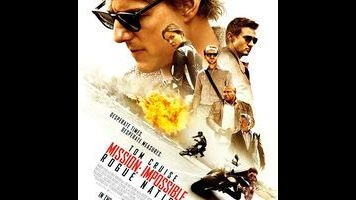Rogue Nation preserves the stand-alone fun of the Mission: Impossible series

Ethan Hunt is a secret agent. He works with a team of high-tech specialists to save the world from terrorists. Often, their work involves dangerous physical feats performed under tight time constraints. That, folks, is about all the backstory you need to know to successfully enjoy Mission: Impossible—Rogue Nation—or for that matter, any of the four other entries in this blockbuster movie series that was once a blockbuster television series. As Hollywood continues to build franchises on top of franchises, turning the summer movie season into a massive crossover event, the M:I films remain blessedly, unfashionably self-contained: They’re stand-alone popcorn entertainments that can be watched in any order, with only the thinnest of connecting continuity between them. Who needs a post-credits tease for next summer’s sequel when you have the pre-credits spectacle of Tom Cruise really, truly, actually dangling from an airplane on its way to the sky?
That’s the first, but definitely not the last, daredevil challenge the star accepts in this locomotive fifth installment, another relentless dose of espionage escapism. Cruise, now 53, still approaches each new Mission as though it were an elaborate game of truth or dare (he never picks truth), channeling his couch-jumping madman enthusiasm into insanely gutsy (or just plain insane) stunt work. Rogue Nation puts his protagonist, aging agent Ethan Hunt, through the globe-hopping wringer, and the conflation of real and fictional exertion—that’s not just the character, but also the actor taking a 150-foot plunge or holding his breath for minutes on end—gives the action a charge of authenticity. What this divisive celebrity headliner seems to understand is that he’s never more likable than when risking life and limb for our perverse enjoyment.
Christopher McQuarrie understands that, too. He was one of three credited screenwriters on last summer’s Cruise vehicle, the tragically underperforming Edge Of Tomorrow, whose eccentric appeal was built at least partially on the sight of its star dying over and over again. McQuarrie, who previously directed Cruise in Jack Reacher and won an Oscar for penning The Usual Suspects, was handpicked by the actor to write and direct Rogue Nation. His chief contribution here is keeping the odds preposterously stacked against our hero, who’s forced to go off the grid when the government—in the latest setback for the Impossible Mission Force, an organization that seems to be in a perpetual state of near-collapse—pulls the plug on his operations. Chased by a bloviating CIA bigwig (Alec Baldwin, gamely spouting angry-police-chief buzzwords like “unorthodox”), Hunt crisscrosses the planet in pursuit of a shadow terrorist group called The Syndicate. A kind of “anti-IMF,” it’s staffed by supposedly dead agents from other intelligence divisions. Their leader (Sean Harris) is a bespectacled, raspy-voiced anarchist, pragmatic to an inhuman fault. He’s like Steve Jobs as played by Hannibal Lecter.
Rogue Nation sometimes struggles to make productive use of its supporting agents—not so much comic-relief sidekick Benji (Simon Pegg), but certainly Brandt (Jeremy Renner), who spends most of the film running interference in the States, and Luther (Ving Rhames), eventually recruited to track down their MIA leader. But that’s partially because the movie needed to make room for a new hire, a mysterious double agent played, spectacularly, by newcomer Rebecca Ferguson. Ilsa, as she’s called, cuts a fierce femme-fatale figure, making short work of goons and building an ambiguously romantic rapport with Hunt, who’s been stripped, without explanation, of the personal life Mission: Impossible III provided him. The movie also supplies her with a real conflict, a crisis of allegiance that syncs up well with Rogue Nation’s deeper concerns about the havoc intelligence work can wreak on moral compasses. She’s not just a fine sparring partner for Cruise, but maybe the heart of the picture, lending its terrific spy games some emotional stakes.
Of course, the true X-factors of these movies, with their fairly interchangeable plots and nerve-jangling suspense sequences, are the one-and-done directors at the helm. Rather than go full auteur on his formulaic material, McQuarrie instead offers a kind of greatest hits package: Rogue Nation marries the shifting loyalties of Brian De Palma’s original to the kinetic action beats of John Woo’s series nadir and the all-set-piece structure of Brad Bird’s series zenith, adding an omnipotent villain not far removed from the one Philip Seymour Hoffman played in J.J. Abrams’ entry. It’s the least visually or conceptually distinctive of the five movies, leaning on what’s worked before rather than forging its own path.
But if McQuarrie doesn’t put as singular of a stamp on the M:I brand as his predecessors did, he proves himself more than qualified to run the control booth of a perpetual motion machine. Rogue Nation, like the similarly propulsive Ghost Protocol, often feels like a pure instrument of fun, dragging Hunt through an ongoing series of precarious situations. There’s a crosscutting, Hitchcockian skirmish in the rafters of the Vienna Opera House, a tight motorcycle pursuit through heavy traffic, and a heist sequence—a series specialty—in which Hunt must filch some sensitive data from a circular underwater vault, dodging a rotating crane as his oxygen supply dwindles. McQuarrie mounts these sequences with playful booby-trap precision; in one particularly inspired moment, a car blows up in the background of the shot, seconds before Benji speeds a getaway vehicle into the foreground. Mostly, though, he just keeps the whole enterprise hurtling forward, from one hit of pleasure to the next. Whoever occupies the director’s chair of the next Mission: Impossible movie would be wise to study his cut-the-fat approach. That’s assuming, of course, there is a next Mission: Impossible movie. Please let there be a next Mission: Impossible movie.